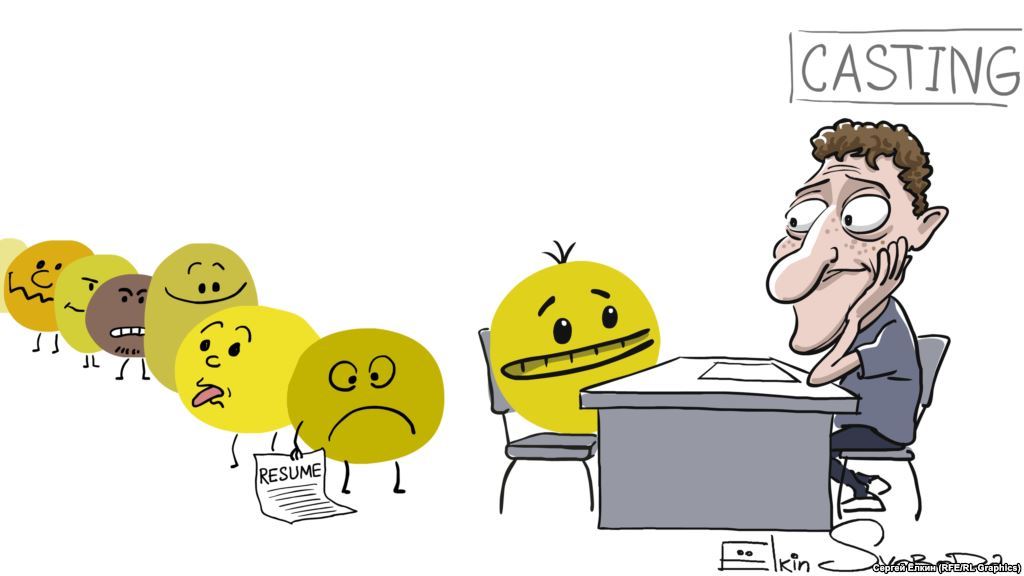From whom Facebook stole likes, or copyright limits
Facebook launched new likes and immediately got plagiarism claims. This time , it is argued that the idea of dividing “Like” into different emotions belongs to Moscow writer Lana Kaplan (not to be confused with Fanny Kaplan, who shot Lenin).

It should be noted that Facebook is not the first to receive such claims. Even missing the story of the Winklevoss twins, who accused Zuckerberg of stealing the idea and the network code (and received $ 65 million), we can recall that Facebook also defended the right to use the “like” button in court. The use of the “like” and “share” buttons was disputed by the heirs of the Dutch programmer Van der Meer, creator of the social network Surfbook .
Unlike the Kaplan story, the Dutch plaintiffs were in a stronger position, since they did not defend the idea of like expressed in a literary work (we will return to it), but a patented solution . However, the lawsuit was denied .
What about the idea of likes in a book?
What is written with a pen cannot be cut down with an ax. And the published book is an excellent proof that the idea came to the author’s head before it was implemented by a social network.
Quote:
You can add explanations to the “like”. For example, let such “likes” appear: “sympathetic like”, “like from idleness”, “like revengeful”, “like admiring”, “like average”.
Victim's lawyer says you can cut down at least $ 100k per idea. But the feature of copyright protection is overlooked. They are protected through their form, and an idea without a form cannot be protected.
Clause 5 of Article 1259 of the Civil Code of the Russian Federation
Copyright does not apply to ideas, concepts, principles, methods, processes, systems, methods, solutions to technical, organizational or other problems, discoveries, facts, programming languages, geological information about subsoil.
In other words, the practical implementation of the ideas expressed in the book is not protected by law. For example, if you publish a recipe for a dish, you will not be able to prohibit cooking using it, but you will be able to prohibit its copying in other publications. An exception for practical implementation is only for certain copyright objects, namely for an architectural, design, urban planning or landscape gardening project (paragraph 10, paragraph 2 of article 1270 of the Civil Code of the Russian Federation). So if a house is built according to your drawings, this will be the use of the copyright object.
In other cases, it is better to use appropriate protection mechanisms - patents. Although, as the case with the Dutch inventor showed, even a patent is not always a panacea. Moreover, the ideas published in the book cannot bring you money for their implementation, and as you understand, the writer Kaplan does not shine $ 100k from Facebook.

It should be noted that Facebook is not the first to receive such claims. Even missing the story of the Winklevoss twins, who accused Zuckerberg of stealing the idea and the network code (and received $ 65 million), we can recall that Facebook also defended the right to use the “like” button in court. The use of the “like” and “share” buttons was disputed by the heirs of the Dutch programmer Van der Meer, creator of the social network Surfbook .
Unlike the Kaplan story, the Dutch plaintiffs were in a stronger position, since they did not defend the idea of like expressed in a literary work (we will return to it), but a patented solution . However, the lawsuit was denied .
What about the idea of likes in a book?
What is written with a pen cannot be cut down with an ax. And the published book is an excellent proof that the idea came to the author’s head before it was implemented by a social network.
Quote:
You can add explanations to the “like”. For example, let such “likes” appear: “sympathetic like”, “like from idleness”, “like revengeful”, “like admiring”, “like average”.
Victim's lawyer says you can cut down at least $ 100k per idea. But the feature of copyright protection is overlooked. They are protected through their form, and an idea without a form cannot be protected.
Clause 5 of Article 1259 of the Civil Code of the Russian Federation
Copyright does not apply to ideas, concepts, principles, methods, processes, systems, methods, solutions to technical, organizational or other problems, discoveries, facts, programming languages, geological information about subsoil.
In other words, the practical implementation of the ideas expressed in the book is not protected by law. For example, if you publish a recipe for a dish, you will not be able to prohibit cooking using it, but you will be able to prohibit its copying in other publications. An exception for practical implementation is only for certain copyright objects, namely for an architectural, design, urban planning or landscape gardening project (paragraph 10, paragraph 2 of article 1270 of the Civil Code of the Russian Federation). So if a house is built according to your drawings, this will be the use of the copyright object.
In other cases, it is better to use appropriate protection mechanisms - patents. Although, as the case with the Dutch inventor showed, even a patent is not always a panacea. Moreover, the ideas published in the book cannot bring you money for their implementation, and as you understand, the writer Kaplan does not shine $ 100k from Facebook.
